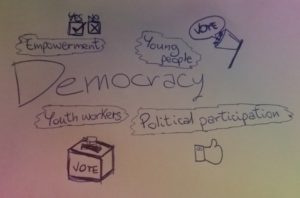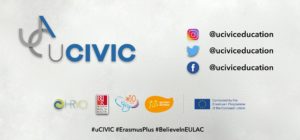[:it]
U-Civic è un progetto realizzato da Human Rights Youth Organisation (HRYO) in Italia, Asociación Civil Gurises Unidos in Uruguay, Centro de Estudios Paraguayos Antonio Guasch (CEPAG) in Paraguay and Biderbost, Boscán & Rochin (BB&R) in Spagna. Si inserisce nel quadro della key action 2, riguardante la cooperazione per l’innovazione e lo scambio di buone pratiche, e specificamente nell’azione di rafforzamento delle capacità per i giovani dei paesi dell’ACP, America Latina e Asia. È finanziato con il sostegno del programma Erasmus+ della Commissione Europea.
La premessa su cui si basa la proposta progettuale è la diminuzione della legittimazione politica tra i giovani Europei e Latinoamericani e la conseguente compromissione della qualità della democrazia, soprattutto tra i giovani appartenenti alle classi sociali meno abbienti.

L’idea principale del progetto concerne l’utilizzo di nuove tecnologie per l’educazione civica. La creazione di nuove conoscenze per supportare gli youth workers nell’incremento delle competenze politiche tra le nuove generazioni.
Pertanto “U-Civic” intende: realizzare uno scambio di buone pratiche (tra Italia, Paraguay, Spagna e Uruguay) su cui le strategie operino efficacemente e che siano allettanti per la legittimazione civica e politica delle nuove generazioni (specialmente i giovani con minori opportunità). Inoltre, è prevista la creazione di un Toolkit virtuale e gratuito per l’empowerment civico-politico delle nuove generazioni.
Nonostante i differenti contesti in cui operano le quattro organizzazioni, possiedono tutte delle peculiarità che rendono significativo il loro contributo al progetto.
HRYO è un’organizzazione non governativa i cui obiettivi principali riguardano il rafforzamento dei diritti umani e la legittimazione politica dei giovani con minori opportunità.
Gurises Unidos si dedica alla protezione dei diritti umani, specialmente dei bambini e dei giovani, delle loro famiglie, comunità e dei contesti vulnerabili in Uruguay.
CEPAG è un’organizzazione focalizzata sullo sviluppo dei giovani, soprattutto i lavoratori e coloro che hanno meno opportunità.
BB&R è un’impresa internazionale di consulenza con un rilevante ruolo nell’ambito dell’educazione civica per i giovani.
Le quattro entità hanno pregevoli esperienze di promozione della democrazia e responsabilizzazione politica in contesti vulnerabili, quindi sono pienamente qualificate per raggiungere gli obiettivi del progetto. Così, la promozione della partecipazione politica e l’empowerment saranno perseguiti con una buona pianificazione da parte delle quattro organizzazioni, coinvolgendo gli youth workers nell’implementazione delle competenze civiche.
Durante il progetto HRYO coordinerà ogni fase del programma e si interfaccerà con l’EACEA, l’Agenzia esecutiva della Commissione Europea per l’istruzione, gli audiovisivi e la cultura.
I partners implementeranno diverse attività, senza trascurare la connessione con le organizzazioni e l’amministrazione a livello locale, regionale e nazionale.
L’elemento innovativo del progetto, cioè la creazione del Toolkit, sarà il risultato di un processo che si sviluppa attraverso varie fasi dell’implementazione e di conseguenza il suo impatto sarà valutato attraverso la comparazione tra i fruitori e i non fruitori.
La realizzazione del progetto ha previsto una riunione di coordinamento, seguita da un questionario online e un focus group finalizzati alla raccolta di informazioni sugli youth workers, sul possibile contenuto dell’App e le opportunità per i giovani. In seguito all’analisi dei risultati, le organizzazioni realizzano uno scambio di buone pratiche attraverso il coinvolgimento dei lavoratori e dei giovani. Al termine di questa fase, i partners iniziano a preparare il prototipo del Toolkit basandosi sui bisogni dei partecipanti.
Le organizzazioni raccoglieranno le reazioni sull’App e successivamente creeratnno la versione definitiva. In seguito, durante la mobilità a Montevideo, un gruppo di youth workers, selezionati dai quattro paesi, saranno formati sull’utilizzo e l’applicazione del Toolkit. In questo modo gli youth workers sperimentano il supporto digitale nel loro lavoro, al fine di promuovere le competenze civiche quali cittadinanza attiva, conoscenza della politica, attenzione e partecipazione alla politica, efficacia e tolleranza politica.
Il progetto proseguirà con un’altra mobilità finalizzata alla valutazione dell’impatto della App. Sulla base di questa esperienza, i partners creeranno un libro digitale sull’utilizzo del Toolkit.
Alla fine del progetto la App gratuita sarà caricata sulle piattaforme Google Play/iTunes Store e in seguito i partners ne promuoveranno l’uso con incontri nazionali programmati.
Il progetto fornisce risorse materiali per la formazione e strumenti per la formazione degli youth workers, prevede riunioni, report e strumenti per la promozione delle competenze chiave dei giovani.
I principali risultati del progetto saranno: metodi di formazione per youth workers e formatori, cooperazione, attività di interconnessione e apprendimento tra pari, metodi che promuovano le competenze chiave dei giovani.
I risultati del progetto saranno diffusi attraverso pagina web, social networks, incontri strategici che coinvolgano le imprese, video ed e-books, workshop e la pubblicazione su Erasmus + Project Results Platform.
U-Civic is a project implemented by Human Rights Youth Organisation (HRYO) in Italy, Asociación Civil Gurises Unidos in Uruguay, Centro de Estudios Paraguayos Antonio Guasch (CEPAG) in Paraguay and Biderbost, Boscán & Rochin (BB&R) in Spain. It falls within the framework of key action 2, namely cooperation for innovation and the good practices exchange, and specifically on the action of Capacity Building for Youth in ACP countries, Latin America and Asia. Funded with support from the Erasmus+ Programme of the European Commission.
The premise to the project proposal is the decreasing political empowerment among European and Latin American young people. As a result, the quality of democracy could be described as undermined, above all among young people belonging to the poorest social classes.
 The main idea of the project is to use new technologies for civic education. Generating new knowledge on how to support youth workers to increase the political competencies among new generations.
The main idea of the project is to use new technologies for civic education. Generating new knowledge on how to support youth workers to increase the political competencies among new generations.
Therefore, the “U-Civic” aims to: generate an exchange of good practices (between Italy, Paraguay, Spain and Uruguay) on which strategies really work and are attractive for the civic-political empowerment of new generations (specially youngsters with fewer opportunities). In addition, it is planned to set up a free virtual ToolKit for civic-political empowerment of new generations.
In spite of the different environment where the organisations operate, they all have specific features which makes a significant contribution to the project.
The HRYO is a non-governmental organisation which has as principal objectives the enhancement of human rights and the political empowerment of young people with fewer opportunities.
The Gurises Unidos is devoted to the protection of human rights, especially about children and young people, their families, communities and vulnerable contexts in Uruguay.
The CEPAG is an organization focused on the development of young people, above all workers and those who have fewer opportunities.
The BB&R is an international consulting firm with a prominent role in the field of civic education for young people.
All the four organizations have valuable experience of democracy-building and political accountability in vulnerable context, so they are fully qualified to operate in order to reach the objectives. Therefore, the promotion of political participation and empowerment is going to be pursued with good planning by the four entities, involving youth workers in implementing civic competencies.
During the project HRYO is going to coordinate each step of the program and it will interface with the EACEA, the Education, Audiovisual and Culture Executive Agency of the European Commission.
All the organizations will implement several activities, without overlooking the connection with the organizations and the administration at the local, regional and national level.
The innovative element of the project, namely the creation of the Toolkit, is going to result from a process developed along the different phases of the implementation and, subsequently, its impact will be evaluated through the comparison of users and non-users.
The implementation of the project foresaw a coordinating reunion, followed by online survey and a focus group aimed at collecting information about youth workers, possible content of the App and opportunities for young people. After the analysis of the results, the organizations realize the exchange of good practices through the involvement of workers and young people. At the end of this phase, the partners start to prepare the prototype of the Toolkit based on the needs of the participants.
The organizations are going to collected feedbacks on the App and then they draw up its final version. After that, during a mobility in Montevideo a group of youth workers, selected from the four countries, are going to be trained about the use and the application of the Toolkit. Therefore, the youth workers are going to experiment this digital support in their job, in order to foster the civic competences like active citizenship, political knowledge, political attention, political participation, political efficacy and political tolerance.
The project will continue through another mobility aimed at evaluating the impact of the App. Based on the experience, the partners will create a digital handbook on the use of the Toolkit.
At the end of the project the free App will be uploaded on Google Play/iTunes Store and then the partners will promote the use of the App by planning national meetings.
The project provides for training resource materials, training tools for youth workers, meeting, report and tools fostering young people’s key competencies.
The main outcomes that will result are: training methods for youth workers and trainers, cooperation, networking and peer-learning activities, methods fostering young people’s key competencies.
The project’s results will be disseminated through web page, social networks, strategic meetings involving firms, videos and e-books; workshops and the publication on the Erasmus + Project Results Platform.



Comments are closed